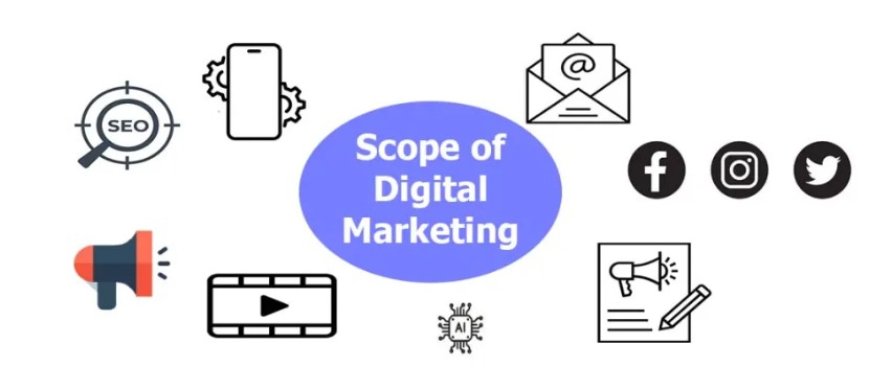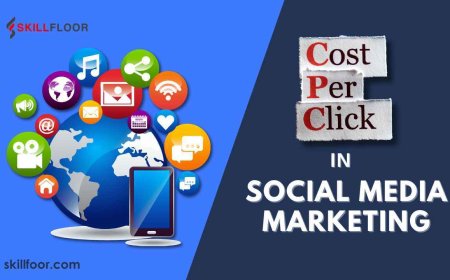The Expansive Scope of Digital Marketing: The Digital Landscape
Explore the dynamic world of digital marketing in 'The Expansive Scope of Digital Marketing: The Digital Landscape.

Digital marketing is the practice of promoting products or services using digital channels and technologies. Its significance lies in its ability to reach a vast and diverse online audience, making it a cornerstone of modern business strategies. As technology has transformed consumer behavior, marketing has evolved from traditional methods to a dynamic, data-driven approach in the digital age. In this ever-changing landscape, understanding the scope and impact of digital marketing is crucial for businesses seeking success in today's competitive market.
Channels and Platforms
In the realm of digital marketing, various channels and platforms serve as powerful tools to reach and engage with target audiences effectively.
Social Media Marketing (SMM) harnesses the immense reach and interactivity of platforms like Facebook, Instagram, Twitter, and LinkedIn. It involves crafting compelling content, fostering community engagement, and leveraging paid advertising to amplify brand presence.
Search Engine Optimization (SEO) focuses on enhancing a website's visibility on search engine results pages. Through meticulous keyword research, content optimization, and backlink strategies, businesses aim to secure higher organic rankings and attract quality traffic.
Content Marketing revolves around the creation and distribution of valuable, relevant, and consistent content. This encompasses blog posts, videos, infographics, and more. By providing valuable information, businesses establish authority and forge lasting connections with their audience.
Email Marketing remains a cornerstone of digital communication. Personalized messages, segmented lists, and automated campaigns nurture leads, re-engage existing customers, and drive conversions. A/B testing and analytics refine strategies for optimal results.
Pay-Per-Click Advertising (PPC) offers a targeted approach to advertising on platforms like Google Ads and social media networks. Advertisers bid on specific keywords, and they pay a fee only when their ad is clicked. This method ensures that marketing budgets are allocated efficiently for maximum ROI.
Influencer Marketing leverages the popularity and credibility of influential individuals in specific niches. Collaborations with influencers can amplify brand visibility, build trust, and drive engagement. Success lies in aligning the influencer's audience with the brand's target demographic.
Affiliate Marketing involves partnerships with external individuals or businesses who promote products or services in exchange for a commission. This performance-based model allows for cost-effective customer acquisition and broadens the reach of a brand's offerings.
Each of these channels and platforms brings its unique strengths to the digital marketing landscape. When strategically integrated, they form a comprehensive approach that allows businesses to not only reach their target audience but also engage and convert them effectively.
Data Analytics and Insights
Tools for Tracking and Analyzing Digital Marketing Efforts
In the realm of digital marketing, data is the driving force. Various tools and platforms exist to help marketers track and analyze their efforts. Google Analytics, for instance, provides valuable insights into website traffic, user behavior, and conversion rates. Social media platforms offer native analytics tools, and email marketing software tracks email campaign performance. Robust marketing automation systems integrate data from multiple sources, offering a comprehensive view of marketing efforts.
Key Performance Indicators (KPIs) for Different Channels
Different digital marketing channels have their own unique KPIs that gauge success. For instance, social media marketing may focus on engagement metrics like likes, shares, and comments, while email marketing often looks at open rates and click-through rates. SEO efforts might assess rankings and organic traffic, while PPC advertising considers metrics like click-through rate (CTR) and cost per click (CPC). Understanding and tracking the appropriate KPIs for each channel is essential for optimizing performance.
Conversion Rate Optimization (CRO) Techniques
Conversion rate optimization is a critical aspect of digital marketing. It involves fine-tuning various elements of a website or landing page to improve the percentage of visitors who take a desired action, such as making a purchase or signing up for a newsletter. CRO techniques encompass A/B testing, improving page load times, optimizing forms, and enhancing overall user experience. By systematically testing and optimizing, businesses can boost conversion rates and drive more value from their digital efforts.
A/B Testing and Multivariate Testing for Website Optimization
A/B testing (split testing) and multivariate testing are essential techniques for website optimization. A/B testing involves comparing two versions of a web page (A and B) to determine which performs better. Multivariate testing takes this further by analyzing the impact of multiple variables simultaneously. These tests help identify which design elements, headlines, calls-to-action, or content variations resonate most with your audience. By making data-driven decisions through testing, digital marketers can continually enhance website performance and user engagement.
Customer Relationship Management (CRM)
Customer Relationship Management (CRM) plays a pivotal role in digital marketing by providing a structured approach to managing interactions with customers. It helps businesses understand their audience, personalize communication, and deliver a seamless customer experience. CRM systems serve as centralized repositories of customer data, enabling marketers to make data-driven decisions and tailor marketing strategies to individual preferences.
CRM for Lead Nurturing and Customer Retention:
CRM systems excel in lead nurturing, allowing businesses to track prospects' interactions with their brand. Automated workflows can be set up to send targeted content, such as personalized emails or product recommendations, based on a lead's behavior. Furthermore, CRM is instrumental in customer retention, as it enables businesses to stay engaged with existing customers, offer timely support, and identify opportunities for upselling or cross-selling.
Integrating CRM with Other Marketing Tools and Platforms:
For a holistic digital marketing strategy, integrating CRM with other marketing tools and platforms is essential. This integration streamlines data sharing and ensures a consistent customer experience across various touchpoints. CRM can be integrated with email marketing platforms, social media management tools, analytics software, and e-commerce platforms. This cohesion enables seamless tracking of customer interactions and fosters more effective marketing campaigns and customer relationship management.
Mobile Marketing and App Marketing
Mobile devices have become an integral part of consumers' lives, and as such, mobile marketing and app marketing have gained paramount importance in the digital landscape.
Ensuring that websites and content are optimized for mobile devices is a fundamental aspect of mobile marketing. Mobile-responsive design guarantees that users have a seamless experience, regardless of the device they use. It involves adapting content layout, images, and navigation for smaller screens, improving page load times, and optimizing touch interfaces.
Mobile advertising spans various formats, from mobile search ads to display ads within apps. Effective mobile marketing strategies involve careful targeting based on user behavior and preferences. In-app marketing, on the other hand, allows businesses to engage users within mobile applications, offering opportunities for personalized promotions and user retention.
Location-based marketing leverages users' geographic data to deliver relevant content or offers based on their physical proximity to businesses or points of interest. Push notifications are powerful tools to re-engage app users, delivering timely updates, promotions, or reminders. Crafting personalized and non-intrusive push notification campaigns can boost user engagement
E-commerce and Digital Sales
In the realm of e-commerce, digital marketing plays a pivotal role in driving online sales. Strategies encompass a wide range of techniques, including search engine optimization (SEO) to improve website visibility, pay-per-click (PPC) advertising for targeted product promotion, and email marketing to nurture leads and encourage conversions. Additionally, personalized recommendations and upselling/cross-selling tactics contribute to enhancing sales figures.
The user experience (UX) is paramount for e-commerce success. Digital marketers focus on optimizing website navigation, mobile responsiveness, and page load speed. Clear and persuasive product descriptions, high-quality images, and user-friendly shopping carts are vital components. Ensuring a seamless checkout process and providing various payment options are also essential for reducing cart abandonment rates and improving user satisfaction.
Digital marketing offers a dynamic platform for launching new products and promoting special offers or sales events. Marketers use social media, email campaigns, and content marketing to create buzz and anticipation. Time-sensitive promotions and limited-time offers encourage immediate action. Leveraging influencer marketing and affiliate partnerships can also amplify the reach and impact of product launches and promotions in the digital sphere.
Emerging Trends and Technologies
Artificial intelligence (AI) and machine learning (ML) are revolutionizing digital marketing by enabling data-driven insights, personalized recommendations, and predictive analytics. These technologies automate tasks like chatbots for customer support and enhance ad targeting through algorithmic optimization.
With the rise of voice-activated devices like smart speakers and mobile assistants, optimizing content for voice search has become crucial. Conversational marketing strategies leverage chatbots and natural language processing to engage users in real-time conversations, enhancing customer interactions and support.
VR and AR are transforming marketing by offering immersive and interactive experiences. Marketers are using AR for virtual try-ons and VR for virtual store visits, creating engaging brand interactions that leave a lasting impact on consumers. These technologies are set to reshape how consumers engage with products and brands.
Regulatory and Ethical Considerations
Data Privacy and Compliance
As digital marketing continues to grow, so do concerns regarding the privacy and security of consumer data. Regulations such as the General Data Protection Regulation (GDPR) in Europe and the California Consumer Privacy Act (CCPA) in the United States have imposed strict requirements on how businesses collect, handle, and protect customer data. Adhering to these regulations is not only a legal obligation but also crucial for maintaining trust with your audience.
Ethical Marketing Practices and Transparency in Digital Advertising:
Ethical considerations are paramount in digital marketing. Businesses must strive for transparency in their advertising practices, ensuring that advertisements are not misleading or deceptive. Honest, clear communication with consumers is essential for building and maintaining a positive brand image. Unethical practices, such as clickbait or false advertising, can lead to damage to a brand's reputation and even legal consequences. It's imperative for digital marketers to prioritize ethical conduct in all their campaigns to foster long-term trust and credibility with their audience.
The scope of digital marketing is vast and ever-expanding, encompassing a multitude of channels, strategies, and technologies. It is a dynamic field that requires marketers to stay current with evolving trends and tools. Continuous learning and adaptation are paramount for success in this digital landscape, as businesses strive to connect with their audience in meaningful ways and achieve their marketing goals. Embracing this evolving nature is key to thriving in the digital marketing arena.






























































